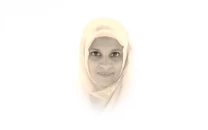Life of a transgender person: a trail of pain
The society seems to have closed its doors to this unfortunate segment of society

Another transgender, Shakeel alias Gul Panra, was shot dead on Wednesday in Peshawar after she had finished her performance in a wedding ceremony and was about the leave for her home. Why was she targeted? The killer probably knew that the life of a transgender person hardly carries any value and no one will be willing to pursue this murder — neither her family nor the state.
The life of a transgender person is a trail of unimaginable and continuous pain. Disowned and abandoned from the very first day of life, mocked, ridiculed and mistreated throughout the life, it is the sum total of life of a transgender person.
Call them by any name — Khawja Sara, Hijra, Mukhannas, eunuchs, transgender, transsexuals or transvestites — whatever may be the nomenclature, origin, caste and clan, the trial remains the same. The society seems to have closed its doors to this unfortunate segment of society.
Admit it or not, our heads are hung in shame when a transgender is born in a house. We feel embarrassed when a transgender knocks the window of a car with his crude and not-so-decent comments. We all try to hide ourselves at a sight of a transgender standing on some deserted road waiting for ‘unknown reasons’. We feel highly ashamed when any transgender claims his/her lineage from the noble families. Confess it or not, we have abandoned our children to the mercies of fate, to lead their lives in abject poverty and slums, perform during wedding ceremonies, sing best wishes and prayers on the occasion of birth of a newborn, and most frequently to live as sex workers.
Section 328 of Pakistan Penal Code states that “whoever being the father or mother of a child under the age of twelve years, or having the care of such child, shall expose or leave such child in any place with the intention of wholly abandoning such child, shall be punished with imprisonment of either description for a term which may extend to seven years, or with fine, or with both.” It can only be a wild guess as to how many transgender children have been abandoned and how many of such parents punished under law.
What is the fault of a person who happens be a transgender? Quite Simple. They are not like us. They are neither male nor female. They are born with a disability that we are not ready to accept. We are not ready to appreciate their existence as a special creature of God. We don’t feel comfortable living with them and also giving them opportunity to live as equal human beings.
If we look back, transgender persons were considered as trusted and loyal custodians during the Mughal period, perhaps due to the fact that they don’t have ability to reproduce nor do they have any claimants. They were essential part of any harem of rich people and nawabs, serving as housemaids, cooks etc. By virtue of their positions, they reportedly wielded great influence. The downfall of Mughals came with a heavy cost for the transgender community also. Remember the times of Gora Sahib Bahadur. The Criminal Tribes Act of 1871 bracketed eunuchs into the category of Criminals Tribe. The Act went to an extent that “any eunuch ... who dances or plays music, or takes part in any public exhibition” could be sentenced to up to two years of imprisonment along with a fine. The law closed all avenues for transgender and took away even what little was left for them to earn livelihood.
In 2009, Pakistan became one of the few Islamic countries to legalise a third sex. In 2017, transgender persons were able to get national ID cards and passports. In 2018, Transgender Persons (Protection of Rights) Bill 2018 was passed by Parliament with an aim to provide for protection, relief and rehabilitation of rights of the unfortunate community.
The law gave the right to a transgender person to be recognised as per his or her self-perceived gender identity and to get registered with all government departments including NADRA and obtain driving licence and passport.
The law prohibited any kind of discrimination against transgender persons in educational institutions, employment, trade or occupation, healthcare services, enjoyment of use of any goods, accommodation, service, facility, benefit, privilege, transportation, reside, sale, purchase, rent or otherwise occupy or inherit any movable and immovable property and any opportunity to stand for or hold public or private office.
Chapter IV for the law obligated the government to take steps to secure full and effective participation of transgender persons and their inclusion in society. The government is bound by law to establish protection centres and safe houses to ensure their rescue, protection and rehabilitation, besides providing them medical facilities, psychological care, counseling and adult education. The state is also obligated to establish separate prisons, jails, confinement cells for them. Furthermore the law obligates the state/government to formulate special vocational training programmes, facilitate and incentivise financial support for small businesses owned by transgender persons.
In December 2019, the Government of Pakistan announced extension of Sehat Insaf Card facility for the transgender community, the first in the country’s history, to provide relief to the most vulnerable segment of society. Among interventions at provincial level, Punjab Social Protection Authority (PSPA) has formulated Transgender Person Welfare Policy. PSPA commits to initiate Masawaat program comprising conditional cash transfers for skill building, unconditional cash transfers for elderly transgender persons and micro credit for promoting entrepreneurship among transgender persons. The Government of Sindh in October 2019 has also fixed a 0.5% quota of jobs in all government departments for members of the transgender community.
Despite landmark legislation of 2018 and few steps taken by provincial governments, the situation vis-à-vis some of the basic facilities likes education, healthcare, employment, identity and representation, safety and social comfort and any prospects of social mobility remains far from satisfactory even till date.
The Covid-19 pandemic aggravated the plight of the trans community in the country. A handful of transgender persons — who by some stroke of luck were able to find slightly decent way of earning their living as makeup artists, barbers, or through other small jobs — were rendered jobless and left with no other option but to face abject poverty and sell their bodies for a living. It is interesting to note that the 2017 census could only record 10,418 transgender persons in the country with 2,767 in rural and 7,651 in urban areas. With such incredulous data, how could one expect any effective policy formulation?
What should then be the way forward? The government that has chosen Riyasat-e-Madina as its role model has a huge responsibility towards ameliorating the plight of such marginalised and vulnerable groups. There is no evidence to suggest that the inability to reproduce can also affect mental faculties or physical abilities to perform tasks that human beings with normal sex can do. A transgender person can be as good a professional as any man or woman can be; has the same sentiments, emotions, feelings of pain and happiness as we all have; and can be excellent teachers, health workers, technicians, agriculturists, corporate leaders, civil servants and so on. All we need to do is open up our hearts and minds towards this unfortunate community. Fulfilling various obligations under Transgender Persons (Protection of Rights) Bill 2018, reserving quota in jobs at federal and provincial levels, and launching awareness campaign for changing societal mindset will go a long way towards providing relief to the transgender community in our country.
Published in The Express Tribune, September 16th, 2020.
Like Opinion & Editorial on Facebook, follow @ETOpEd on Twitter to receive all updates on all our daily pieces.
















COMMENTS
Comments are moderated and generally will be posted if they are on-topic and not abusive.
For more information, please see our Comments FAQ